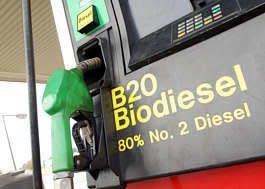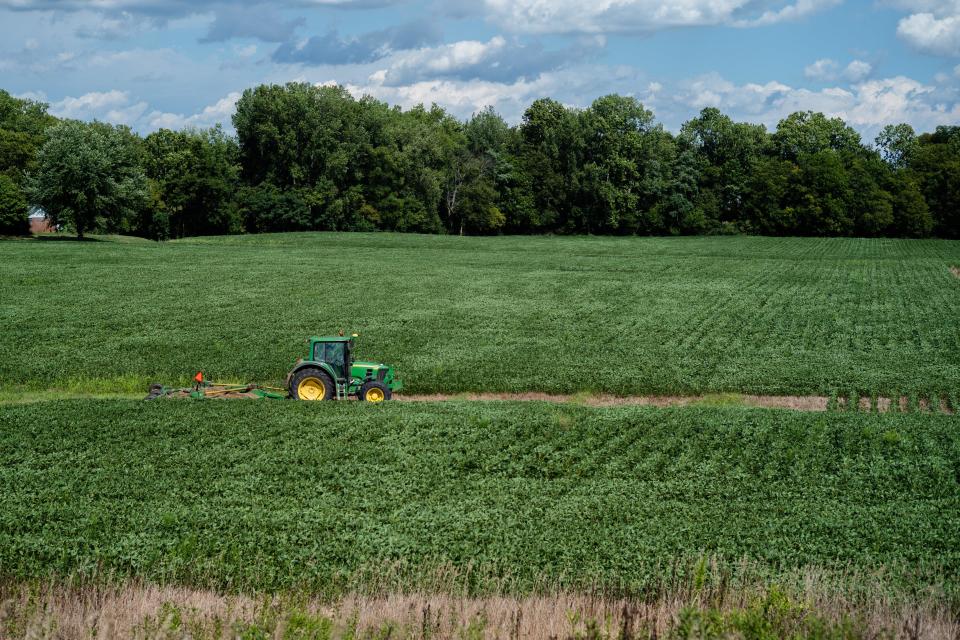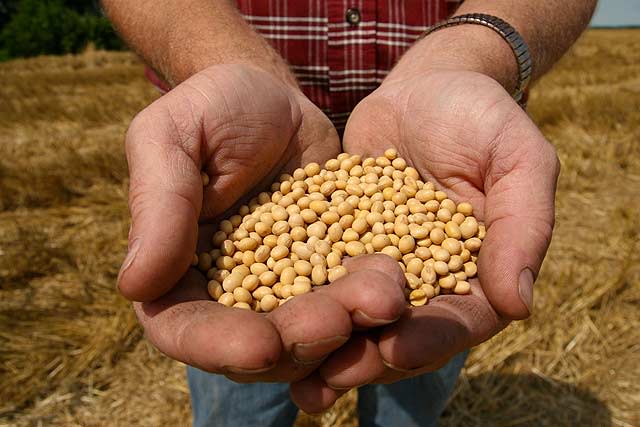Riding on soybeans? Ohio's most important legumes a better way to power vehicles |Opinion
![Soybeans ready for harvest on a Licking County farm [Dispatch file photo]](https://s.yimg.com/ny/api/res/1.2/dKQBkqcs1KMi.OrKq4PP1Q--/YXBwaWQ9aGlnaGxhbmRlcjt3PTEyNDI7aD05MDA-/https://media.zenfs.com/en/the-columbus-dispatch/b9781a7e62cf012727a4803821de78ac)
Cornell Robertson is the Franklin County engineer.
With gasoline prices still unusually high, and with climate change warranting us to reduce greenhouse gas emissions, the need to use cleaner, renewable and domestically produced energy is greater than ever.
In 2019, the Franklin County Engineer’s Office began converting its fleet’s diesel-powered vehicles and equipment to biodiesel.
Biodiesel is a renewable fuel for vehicles with diesel engines that is made from soybean oil and other vegetable oils blended with petroleum diesel.
Today, all of our diesel-powered trucks, bulldozers, tractors, and heavy equipment run on B20 biodiesel, a blend of 20% biodiesel and 80% petroleum diesel fuel.
More:Auto Bits: 3 ways soybean farmers’ biodiesel helps clear the air
The Franklin county engineer is not the only government entity in Greater Columbus that has switched to biodiesel.

Other central Ohio agencies such as the City of Columbus and the Solid Waste Authority of Central Ohio (SWACO) have been transitioning their fleets to biodiesel and other alternative fuels over the past decade.
We made the switch because we wanted to become more fiscally, environmentally, and socially responsible. Moving to biodiesel has allowed us to reduce our emissions by using a cleaner, renewable fuel source without sacrificing performance or increasing costs, making this a sound decision.
More:How to submit guest opinion columns to the Columbus Dispatch
We were able to switch our fleets without making any modifications to the vehicles’ existing engines.
Now, our maintenance costs are actually lower than before because biodiesel is better for the engines in our fleet. In fact, most diesel engine original equipment manufacturers approve the use of B20 because it results in high-quality performance as well as longer-lasting engines.
More:From Waste to Resources: Columbus makes bold move with Climate Action Plan
We’re not the only ones who benefit from using biodiesel. Since biodiesel is made with soybeans and other plants grown by U.S. farmers, we’re helping to reduce our country’s dependence on foreign oil. Using biodiesel also supports soybean farmers by creating a strong demand for their crop.
And it’s good for the environment.

Biodiesel is not only made from soybean oil and similar plant-based resources that might have otherwise been discarded, but it’s also a cleaner-burning fuel, so it produces less pollution and fewer greenhouse gases than gasoline or conventional diesel.
Biodiesel is better not only for engines and the environment, but also for human health. Clean Fuels Alliance America recently commissioned a study — funded in part by the Ohio Soybean Council — that shows the potential health impacts of switching from petroleum-based diesel to pure biodiesel.
The study, conducted in 15 cities considered to be among the most polluted in the U.S., showed the use of pure biodiesel resulted in fewer premature deaths, decreased cancer risk, fewer lost workdays, and reduced asthma attacks.
More:Used tires, bacon grease can be the fuel of the future
Biodiesel is a solution that is not only sustainable and affordable, but also available right now. There’s no need to wait while other alternative energy sources are developed or become more readily available. Electrification, for example, is still many years away for the types of heavy-duty trucks often used in public and private fleet operations.

And although my office is very interested in renewable diesel—perhaps an even more beneficial green energy choice than biodiesel—it’s not a viable option yet because of its limited availability in the Midwest.
Organizations that adopt the use of biodiesel will have a positive impact on both their bottom line and the environment. They’ll reduce fuel and maintenance costs while, at the same time, improve air quality and increase our country’s energy independence.
Cornell Robertson is the Franklin County engineer.
This article originally appeared on The Columbus Dispatch: Opinion: How can soybeans be used to fuel vehicles? What is biodiesel?

